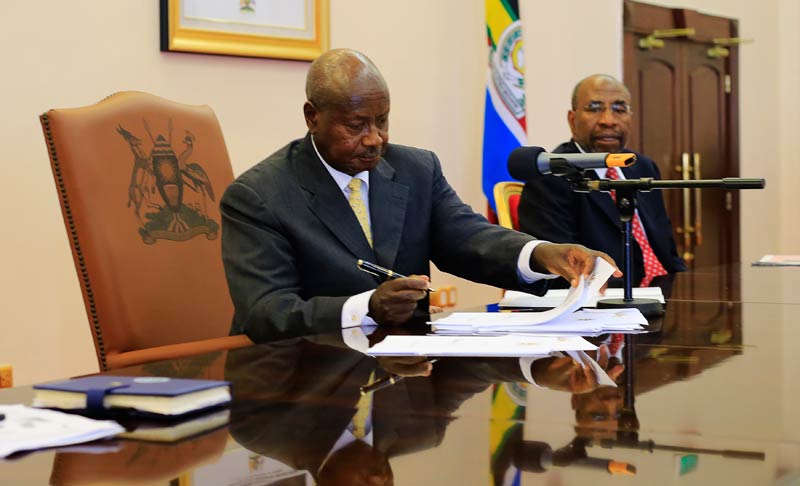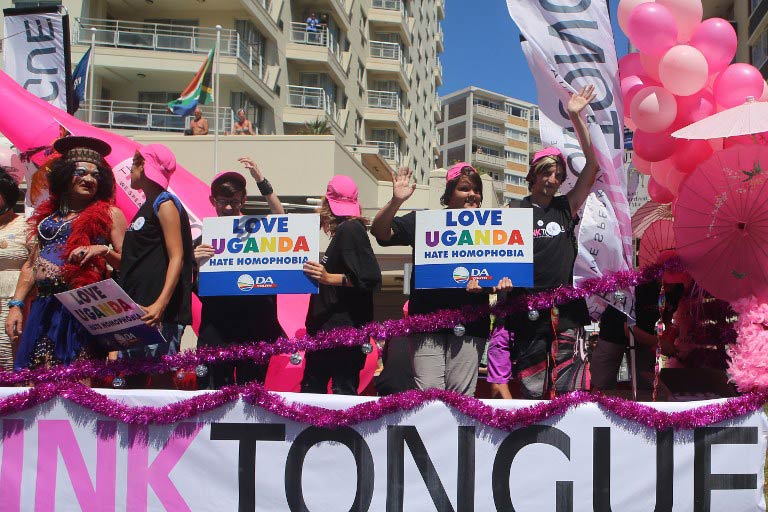The recent passing of the anti-gay law in Uganda and the South African government’s mealy-mouthed reaction to it demand attention.
Internationally, South Africa sponsored and is leading the first ever UN resolution on sexual orientation and gender identity. South Africa also boasts a post-apartheid Constitution that explicitly affirms equality and non-discrimination on the basis of sexuality and gender. Yet our government cannot muster the political stealth to speak against (rather than just about) homophobia when it really counts – as is the case with the recent passing of the homophobic law.

In a statement shortly following the law was passed, the government said that “South Africa takes note of the recent developments regarding the situation of Lesbians, Gays, Bisexual, Transsexual and Intersex persons (LGBTI) worldwide….[and] will, through existing diplomatic channels, be seeking clarification on these developments from many capitals around the world.”
But what’s to clarify? This indicates a deep reluctance to name recent events in Uganda and to take a position on them. It also implies, through the seeking of clarification, that there might be some legitimate rationale for criminalising your own citizens because of their sexual or gender identity.
The South African Human Rights Commission took a bolder position and “strongly reject[s] the notion that the freedom to live and love without fear of violence and regardless of one’s sexual orientation is part of a rights framework from western countries. The struggle for these and other freedoms has been at the heart of liberation struggles throughout the African continent.”
The ANC blocked a motion in Parliament against the law, reflecting its ambivalence to speak out. On the contrary, the former president of Mozambique Joaquim Chissano’s open letter to African leaders is an example of the kind of leadership present persecutions demand.
The anti-gay law and other legislation of its kind give state legitimacy to violence against people on the basis of their real or perceived sexual orientation and/and gender identity. It will also, as is already the case, prompt the forced migration of some LGBTI people.
The law feeds a narrative that positions citizens with non-conforming sexualities and genders as outsiders to the dominant culture of the nation. This is linked to the false notion that homosexuality is unAfricanand, therefore that homophobia isn’t.
In its self-appointed leadership role on LGBTI equality internationally, the South African government should readily offer a counter-narrative to those that peddle prejudice in the name of “Africanness”.
Homophobia in Africa represents a set of complex and intersecting issues – deeply routed in the continent’s colonial past. Violent inscriptions of race, sexuality, ethnicity and gender took place under colonialism and are linked to present-day norms around sexuality. These historical continuities, and how sexuality is racialised, are mostly entirely absent in discussions on homophobia.
Drawing on the ‘savages-victims-saviours’ construct of law professor Makau Mutua (pdf), the west has a keen interest in homophobia that is often framed within these sets of relations. Lurking within much of the public discourse on homophobia in Africa is the notion of the civilising mission of Eurocentric culture (and its human rights frameworks) that will save African culture, and the victims thereof, from its barbarism and its savagery.
One example of this is a recently launched online fundraising effort initiated in the US.
It is a “Rescue fund to help LGBT people escape Africa” and is aimed at “Gays, lesbians, bisexual and transgender people persecuted and trapped in African countries that criminalise their sexuality”. The campaign states that “by contributing to this Rescue Fund you will help me [the initiator of the fund] to save more gay, lesbian, bisexual, transgender and intersex people from Africa escape terrifying persecution.” An online counter shows the money is flowing in. If one donates to “save” an LGBTI person in Africa one is granted a status recognition originally titled as “ultimate saviour”. There are also prizes for donors such as “Nelson Mandela coins” for “passport providers”.

The forced flight of LGBTI from persecutory regimes will require interventions to provide places of refuge and safety. However, promoting an “escape” from Africa to “greener” US pastures, without simultaneously addressing the underlying conditions that force this migration, is dangerous and opportunistic. Dislocated from Africa-based struggles for social justice these feel-good interventions offer no long-term solution to the systemic issues that drive homophobia. At best they are palliative and patronising, at worst they reinforce the victimhood of Africans and the saviour status of westerners.
This is part of the logic that keeps the “homosexuality is un-African” discourse in play.
Other more pernicious saviours are those US religious conservatives who have actively promoted homophobic ideologies across the world and are now pushing such legislation in the US. There is much to be done to challenge these religious groupings and leaders on their home soils to expose their active undermining of sexual and gender rights both domestically and transnationally.
State-sponsored homophobia serves to keep certain power relations intact. Battles over power and identity are increasingly being played out on the bodies of LGBTI people. These battles relate to, among others: contestations around what it means to be “authentically” African; citizens’ pressuring for democracy, inclusion and leadership accountability; basic needs being met in a context of global inequality wherein rich elites govern over the poor; and women increasingly asserting their sexual rights. The scapegoating of LGBTI people and other “deviants” deflects from this inter-connected matrix of issues in which all Africans have a stake.
In this context, South Africa’s tiptoe diplomacy on homophobia in Africa exposes the troubling underbelly of current leadership on democracy and human rights. Whilst Jon Qwelane remains Ambassador to Uganda, in the face of his imminent court appearance for homophobic hate speech, perhaps government’s tread is more firm-footed than might appear.
Melanie Judge is an activist and social commentator. Follow her on Twitter: @melaniejudge.

Comments are closed.